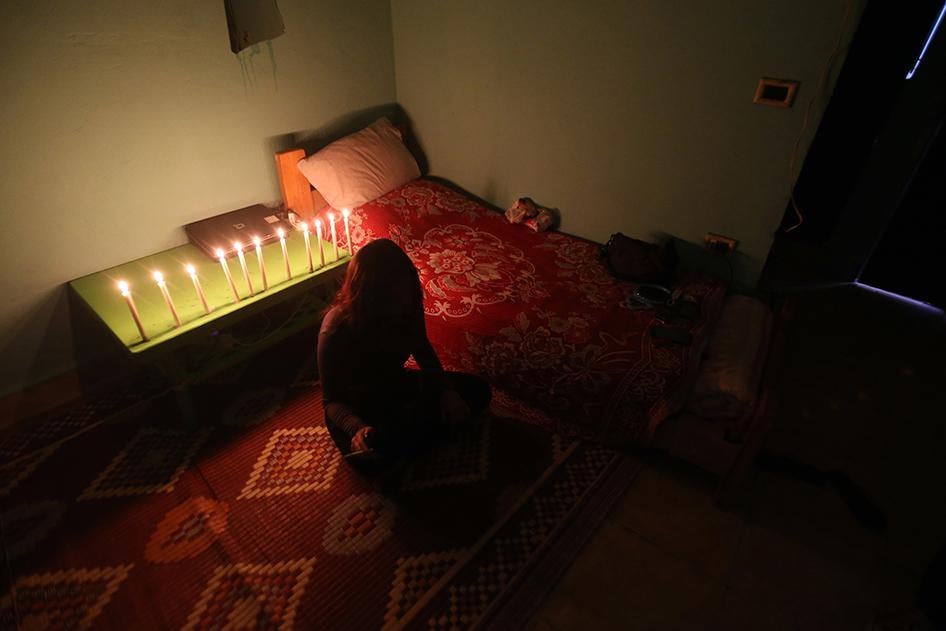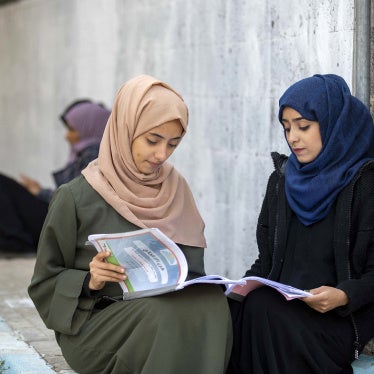(Beirut) – Weaknesses and a lack of coordination in the Lebanese government’s response to sex trafficking is putting women and girls at risk, Human Rights Watch said today, on the World Day against Trafficking in Persons. The government should enforce its anti-trafficking law more effectively, remove obstacles to reporting trafficking, improve police coordination, and provide support to trafficking survivors.
Syrian women appear to be at particular risk of trafficking into forced prostitution and sexual exploitation in Lebanon. A series of raids in 2015 and 2016 found dozens of Syrian women being held against their will and exploited. In March, in one recent case, security officers freed as many as 75 Syrian women from two brothels, Chez Maurice and Silver-B. Authorities arrested and indicted over a dozen people on sex trafficking charges in that case.
“Trafficking into forced prostitution is a grave crime, and Lebanon should continue to step up its response,” said Skye Wheeler, women’s rights researcher at Human Rights Watch. “Survivors of trafficking need justice, services, and support.”
Authorities have taken some important steps to end trafficking. The United States government lifted its ranking of Lebanon from “tier 3” to “tier 2” in its 2016 Trafficking in Persons Report. These annual rankings reflect the US government’s assessment of the records of countries around the world in responding to trafficking. The 2016 report said that Lebanon had made “significant efforts” to meet minimum standards for the elimination of trafficking, including increasing numbers of prosecutions. In 2015, the report said, Lebanon convicted 30 people for trafficking crimes. However, the report noted that, “the law was applied unevenly, as most judges lacked understanding of the crime and knowledge of best practices to handle trafficking cases appropriately.” It also said that “some judges gave convicted traffickers weak sentences.”
Human Rights Watch interviewed two women who had been in Chez Maurice. They said that traffickers lured them from Syria with promises of marriage or jobs, but instead forced them into prostitution in the brothel, in Lebanon’s Ma’ameltein red-light district. They said that the alleged traffickers never paid them, regularly beat them, would not let them leave, and confiscated their identification papers and mobile phones.
Trafficking into forced prostitution is a grave crime, and Lebanon should continue to step up its response. Survivors of trafficking need justice, services, and support.
women’s rights emergencies researcher
Chez Maurice’s owner, Maurice Geagea, had been arrested and released after short periods at least three times prior to the March raid, police officers said. When Chez Maurice was raided in March he was already in prison on charges of trafficking women into forced prostitution in two other locations, said the head of the police counter-trafficking unit, Lt. Colonel Johnnie Haddad, who also said the police knew that Geagea owned Chez Maurice. Haddad said that he had Chez Maurice under surveillance at the time of the March raid by the other police unit.
“The fact that trafficking at Chez Maurice was uncovered repeatedly over years calls into question the effectiveness of the authorities’ response,” Wheeler said. “Lebanon should review how it has handled trafficking at Chez Maurice, and its approach to sex trafficking more broadly.”
Human Rights Watch is concerned that survivors of trafficking are not getting the services and support they need in Lebanon. In the Chez Maurice case, some of the survivors had to wait two or three days in police stations or an apartment before they were given spots in shelters run by nongovernmental agencies. A police officer and staff of a nongovernmental agency described their scramble to find shelter spots. Staff from an international organization that provided health services to the women said there was a substantial delay before the women received care. This suggests problems with coordination and capacity to help survivors. Security officials also released many of the women rescued from Chez Maurice and Silver-B without questioning them or offering protection or access to shelters. Some of the victims were picked up again by their captors before being freed for a second time by police officers.
The country’s 2011 anti-trafficking law directs the Social Affairs Ministry to establish a trust fund for victims of trafficking with assets seized from traffickers. The ministry has not yet established the fund, and ministry staff told Human Rights Watch that the Chez Maurice case had demonstrated weaknesses in their referral chain, which they said they planned to strengthen.
Many obstacles deter victims of trafficking from reporting crimes. Staff of organizations working with trafficking victims told Human Rights Watch that the criminalization of sex work in Lebanon is a significant obstacle. They said that authorities tend to perceive all women in “prostitution” – even if they are trafficked into forced prostitution – as criminals. This means that those forced into prostitution fear being arrested if they approach the authorities.
Human Rights Watch opposes the criminalization of consensual adult sex work. Human Rights Watch believes that criminalization of sex work also creates barriers for those engaged in sex work to exercise basic rights, such as protection from violence, access to justice for abuses, and access to essential health services. Coercing a person to provide sexual services (whether this amounts to sexual assault, trafficking, forced prostitution, or other forms of exploitation) should be criminalized and prosecuted.
In addition, many Syrian women in Lebanon have no legal residency status in the country, which increases risks of sexual and other exploitation and also leaves them afraid to file criminal complaints against abusers.
Human Rights Watch interviewed officials in the Internal Security Forces, nongovernmental service providers, judges, and journalists about the broader problem of sex trafficking in the country and documented at least six cases that appeared to involve groups of Syrian women and girls. Those interviewed said that survivors of trafficking have had to wait months or years to testify in court. Lawyers for nongovernmental agencies and United Nations officials said that cases can take between one and three years to conclude. One lawyer said that three Syrian women she had worked with who were sex trafficking victims returned to Syria rather than press charges because they did not want to stay in Lebanon to testify.
“For the sake of the survivors, the authorities should ensure that all trafficking cases are handled efficiently and fairly in the courts,” Wheeler said. “But prosecutions are not enough. The authorities need a plan to fix broader problems of coordination among government and security agencies, inadequate services, and lack of justice for survivors of trafficking.”









